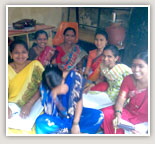
| CONTACT US |
Our Vision |
To develop a comprehensive eye care program with community development interventions in urban slums and rural areas to improve the quality of life and give the gift of sight to all. |
Our Mission |
To promote eye health and control avoidable blindness in the entire community through comprehensive health care which will lead to community development
and a self reliant sustainable program.
|
Our Goal |
To control and prevent avoidable blindness and to provide treatment and rehabilitation facilities to those who have lost vision and give the gift of sight to all children and adults.
|
» |
Success Stories | |||||||||||
|
||||||||||||
| STORY - 5 (Womens’ Self Help Group - SHG) | ||||||||||||
The women from the Babrekar community were mostly house wives or worked as maids in the nearby colonies. They were a mixture of communities, some from the north, some from the south and some from the villages of Maharashtra. |
 |
|||||||||||
Womens’ Self Help Group |
||||||||||||
The CHWs also found out that these women would finish their household work in the morning and either slept in the afternoon or chatted and gossiped with the neighbouring women. They utilised this window of opportunity and started their health awareness sessions every afternoon in the houses of one of the women from the community. The women were sensitised about various issues pertaining to health, especially with respect to the health of their children. Since the level of morbidity in the under five population in the community was reasonably high and children frequently suffered from bouts of cough, cold, fever and diarrhoea, the women started attending these sessions with interest. They were also apprised with topics such as the nutritive value of foods which would help their children gain weight and become healthy children. Gradually when the CHWs realised that they had gained the confidence of the women in the community, they started sensitising the women to other topics of relevance such as being literate, learning micro skills and being able to earn and contribute to the family income. With the support of the CHWs at the community center, the women started attending micro skill courses such as sewing, embroidery, bead work and other small scale courses. After the completion of their courses, the women started implementing their skills and made a steady income from their profits. Now they were able to utilise this money to buy fruits and green leafy vegetables for their children. This improved the health of the children and the family. With these apparent results the husbands’ and families of these women also started encouraging them. |
||||||||||||
The CHWs now advised the women to start their bank accounts and invest their profits for themselves and for the future of their children.
Based on the success achieved the women now decided to get themselves registered as a Women's Self Help Group (SHG) to avail of various government schemes. Under these schemes, the women then started receiving various monetary benefits in the form of loans, which they utilised to start a small scale industry in the community itself. All the women from the group were allotted to be in charge of the accounts and expenditures at monthly intervals. This helped them to gain confidence in maintaining the financial records not only for the Self help group but also for their families. |
 |
|||||||||||
The members sharing a lighter moment. |
||||||||||||
The scheme of the self help group was of immense advantage to the women as this helped them not only to take care of their children and families but also aided as a support system to these women in times of crisis and emergency.
This self help group has not only made the women from the community of Babrekar financially independent but has also helped unite them despite their religious and lnguistic differences. It has been observed that over the past few years the unity of these women has led to a rapid decline in domestic violence and other addictions such as alcoholism and smoking. An empowered woman therefore, not only brings herself out of poverty but also brings about the development of her family and community. |
||||||||||||


